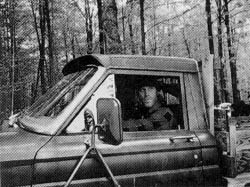
Shooting for Success: A Report from the 1999 IFFM
Written by Michele Meek | Posted by: Anonymous
Also see the List of N.E. Films/Videos at the IFFM.
With success stories like "My Dinner with Andre," "Down by Law," "Slacker," "Clerks," and "The Brothers McMullen," filmmakers at the Independent Feature Film Market know that anything can happen.
Without a doubt, there’s an exhilaration in the air that’s contagious. And I’m not talking only about the frantic handing out of flyers or dressing up in costumes to get people to attend a screening. I mean the excitement of filmmakers seeing the reaction of (in some cases) the very first audience of a film.
"It’s a rush," says Alice Bouvrie, filmmaker of "Iditarod: A Far Distant Place," a sentiment most filmmakers at the IFFM echo.
The distracting and eager atmosphere of the Angelika Film Center is greatly contrasted by the calm of the video library, where more than 25 stations of monitors and headsets are set up for distributors and press to watch the films. (Filmmakers are not allowed here).
Even with some cuts (including half the number of features with screening slots from last year), it’s a whole lot of films to watch (about 400)–even if you do cram in ten or more a day. Since I was there covering the market for NewEnglandFilm.com, I narrowed my focus to watching only films/videos from the area.
Focus on New England
New Englanders were a prominent part of this year’s Independent Feature Film Market again this year. In addition to the three narrative features, three documentary features, 13 works in progress, and three shorts that came from New England, there were plenty who came down to watch films and schmooze. In attendance were David Kleiler (founder of Local Sightings), Tim Grafft (head of production, Mass Film Office), Lisa Carey (former director of Women in Film/Video, New England), among others.

A still from the film "The Battle of City Springs."
Typical to the region, New England was well represented in documentaries (11 of the 13 works-in-progress were docs). Notables were "Latter Day Dogs" a documentary about a group of friends who in 1978 are nudists living a fantasy life on a commune and today are struggling with marital problems, life in politics, and other real-world problems; and "Blue Vinyl" a "toxic comedy" that uncovers the lethal dangers of vinyl-siding production.
My personal favorite was "Mai’s America" a unique and honest personal documentary about a young woman from North Vietnam who comes to America expecting "Gone with the Wind" but crash-lands in rural Mississippi, where she experiences racism, self-proclaimed rednecks, and transvestites. Other diamonds in the rough included "The Battle of City Springs," "Pennyweight," "Mud Season," and "Iditarod: A Far Distant Place."
For more, here is the complete list of New England-related films/videos.
If You Decide To Go
If you are one of the many who decides to take the plunge into next year’s Independent Feature Film Market, here are a few tips:
- Make sure the tape you submit for the video library is excellent quality. There are hundreds of tapes to choose from, and there’s no time to wrestle with quality issues. For example, one film had some sort of tracking problem, and in another the sound was completely inaudible. I didn’t watch either.
- Make sure you provide two copies of your movie for the video library if possible. I’m not sure what IFP’s rules on this are, but I noticed that some had more than one and others didn’t.
- Bring some postcards or nicely designed collateral, but don’t go nuts. Not once did I go to a film because the postcard was "cool."
- Get an unbelievably excellent photo and write the most fantastic description ever for the IFFM catalog. This may seem overstated, but most people I spoke with chose films based on these two things. Hire someone to help if necessary.
- Write a three-sentence pitch for your film and memorize it. There’s a lot of networking going on at the IFFM, and you can single yourself out by having a professional, polished pitch for your film. This way, when someone asks you, "What’s your film about?" you don’t wind up saying something like, "Well, it’s sort of this romance, but then there’s this other plot about this bitter guy who gets a new lease on life. And oh, yeah–it’s really funny, too." And try to make your pitch original. This is so you don’t wind up saying. "It’s a personal documentary about my struggle to come to terms with my cultural background." Even if it’s the best film in the world, it sounds blah.
- Follow up with people who saw your film! You might have a spend a few dollars on postage and a few hours hand-writing notes, but trust me: it would be well worth it. These people include press members, distributors, film festival directors, and other filmmakers. Not only might this help you to sell your film or get it seen somewhere, but it is also a terrific way to get feedback on your work. Don’t miss this opportunity! Last year, not even one of the filmmakers whose films I attended sent me a note asking what I thought or even looking for press coverage.










